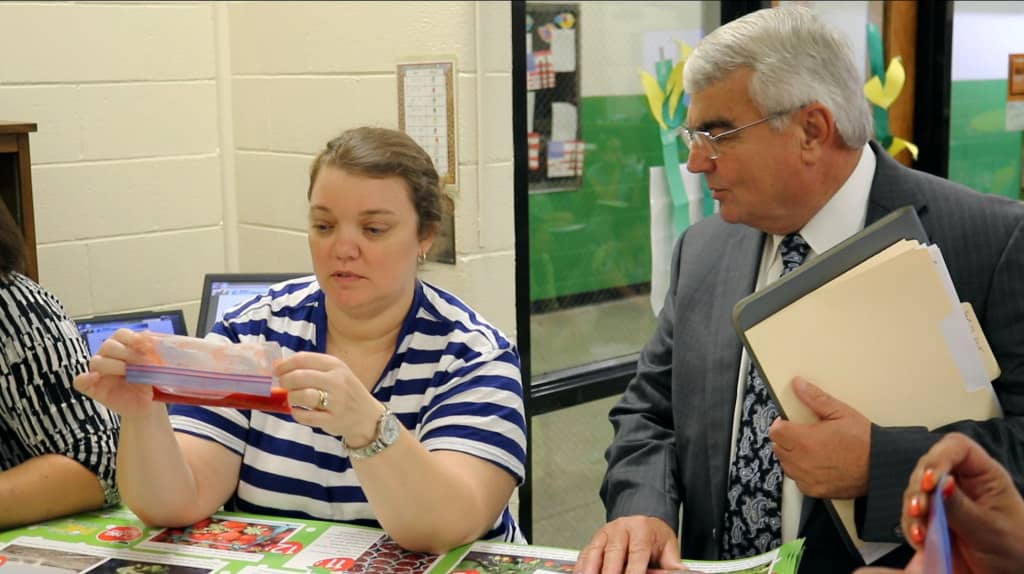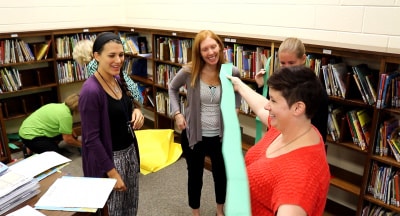At the end of the Farm Bureau’s Ag in the Classroom event in Duplin County, Michele Reedy, the North Carolina Farm Bureau’s director of Ag in the Classroom, gave a presentation on the economic and social impact of the agriculture industry in the state and around the world.
The world’s population is projected to reach 9.6 billion by 2050, Reedy noted.
“How are we going to produce more food and fiber with a smaller rural labor force and diminishing farmland?”
According to Reedy, 22 million people work in the agriculture industry in the United States, but only 4.6 million people actually live on a farm–less than two percent of the nation’s population.
“If you don’t live it and you don’t work in it, then you don’t understand it,” said Reedy. “And we’ve got so many kids now that are in your classrooms who don’t get it.”
Reedy said students in K-5 should have at least an appreciation for where their food comes from and exposure to agriculture as a potential career option later in life.
Beyond the workshop
The event closed with a panel discussion with Reedy and the coaches, giving the teachers a chance to reflect on what they had heard and ask follow-up questions to their new mentors.
One of the key points the coaches made was the importance of buy-in from school leadership. The coaches described the support they had received from their principals and administrators to leave their own classrooms and take part in professional development events like Ag in the Classroom.
“I learn just as much from these workshops as you do,” Frances Baker told the group. “Teachers are the best resource [for professional development].”


Polly Justice, a teacher at North Duplin Elementary School, said the event provided her with tools to take back to her classroom, to engage her students in an active learning model that connects them to the larger community.
“Any type of hands-on learning, whether its just small experiments or small activities, is going to help our students grow,” said Justice. “If we can bring in local farmers … they can expand our kids’ knowledge of their basic surroundings, and just make them more knowledgeable that everything doesn’t come from the grocery store; we have to produce it.”
Justice has plans to partner with the FFA program at a nearby high school to further expose her elementary students to agriculture and has written a grant to start a school garden.
Participants left the workshop not only with new strategies and tools for incorporating agriculture into their classrooms, they also left with a network of fellow professionals and mentors. Mentors they can call on for advice and feedback.
“One of the things that happened at the very end is they got my email address and my phone number, because this does not stop at the workshop today, it goes beyond that,” said Natosha Newton. “I would tell you that the benefit they received today was a sense of community, a sense of support.”
For Erica Edwards, the motivation in organizing the workshop was to expose her colleagues to the tools and strategies she had learned, concepts and practices she is exploring more deeply in her dissertation.
Edward’s said the hands-on approach and mentor support allowed the teachers to “experience the lessons they would be teaching,” projects and experiments centered around a community-based subject.
“The kids could actually relate to the corn stalk they saw growing and the activities they did, the experiments they did, they can relate to that,” said Edwards. “Because if they walk out into their yard, there’s a corn field right beside them or a strawberry patch down the road”
Edwards says it is important for Duplin County, both as a community and school district, to reconnect kids with agriculture.
“We hope that these students will see the importance of it and go to school to get further education and come back to the county, to make our country grow and prosper.”



